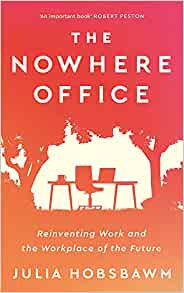I’ve been dipping into Julia Hobsbawm’s forthcoming book The Nowhere Office: Reinventing Work and the Workplace of the Future, which is a very nicely written and upbeat assessment of the shift in white collar working habits as a result of the lockdowns.The book sees the pandemic-wrought changes as an opportunity for a healthier model of office work.
I’m not an unbiased commentator, having (a) long been able to work a day or two a week at home and (b) absolutely *loathed* work-from-home rules. It has been bad for my mental health, bad for the generation of ideas and energy, and made running a research team, and teaching, far harder. So I’m emotionally disinclined to agree either with the prediction that WFH will be the new norm or with the assessment that this will be a good thing. To wrap some logic around it, the force of agglomeration economies in knowledge-based activities has not reduced.
Still, lots of very smart people disagree so I’m trying to keep an open mind. My Productivity Institute colleague Cary Cooper is one, and he and I have debated this (on Zoom….). Nick Bloom at Stanford is another, with some super-impressive research. And now Julia’s book. I don’t want her to be right, but perhaps she is, at least about office workers. After all, many jobs have no WFH option.

